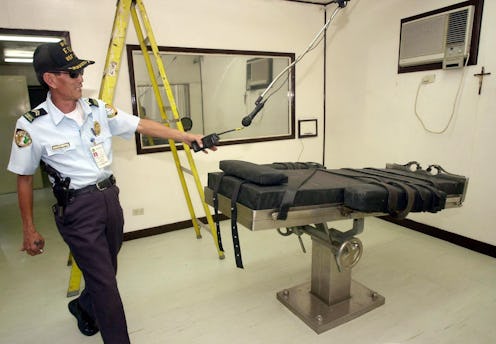News
Botched Execution Fell Short Of Humane Standards
In Oklahoma Tuesday night, the execution of Clayton Lockett was botched and stopped midcourse, leaving the inmate to die of a heart attack more than 40 minutes after the initial injection of midazolam — the first time the drug had been used in the state as part of its lethal three-drug cocktail. A second inmate, Charles Warner, who'd also been scheduled for execution on Tuesday, had his execution postponed following the chaos of Lockett's ordeal. Ironically, both Lockett and Warner had previously sued Oklahoma for not disclosing the names and origins of the execution drugs it was to use.
Lockett, who was found guilty of first-degree rape and murder (among other things) in 2000, died 43 minutes after midazolam was administered. The death appears to have been slow and excruciatingly painful — although midazolam is supposed to induce unconsciousness, he was still awake even 16 minutes after the injection, reportedly trying to move and communicate.
"His body started to twitch, he mumbled something I couldn't understand," Dean Sanderford, his attorney, told CNN. "The convulsing got worse, it looked like his whole upper body was trying to lift off the gurney. For a minute, there was chaos."
Generally, after the initial injection of midazolam, vecuronium bromide is supposed to be administered in order to stop the person breathing. At the end comes potassium chloride, which stops the heart beating. But in Lockett's case, something went terribly wrong. "We believe that a vein was blown and the drugs weren't working as they were designed to. The director ordered a halt to the execution," state corrections department spokesman Jerry Massie said.
Although several witnesses reported seeing the inmate thrash around after the midazolam, Oklahoma Gov. Mary Fallin had a different story, issuing a statement which said that "execution officials said Lockett remained unconscious after the lethal injection drugs were administered."
But she added: "I have asked the Department of Corrections to conduct a full review of Oklahoma's execution procedures to determine what happened and why during this evening's execution of Clayton Derrell Lockett."
The White House also issued a statement about the botched execution, saying that Lockett's execution fell short of the humane standards required when the death penalty is carried out.
Both Lockett and Warner had previously demanded that the state disclose the relevant information about the new cocktail of lethal drugs they were going to use. But last week, the state Oklahoma Supreme Court ruled that the two death row inmates had been told enough to meet constitutional requirements.
This isn't the first time during the last year that untested drug cocktails have caused gruesome executions. Only a few months ago, Dennis McGuire's execution in Ohio took over 26 minutes, causing him incredible suffering in the process. "After weeks of Oklahoma refusing to disclose basic information about the drugs for tonight's lethal injection procedures, tonight Clayton Lockett was tortured to death," said Madeline Cohen, an attorney for Warner, Reuters reports.
As it stands, roughly 3,095 inmates are awaiting execution in 35 states in the U.S. — about 61 of those are women.
